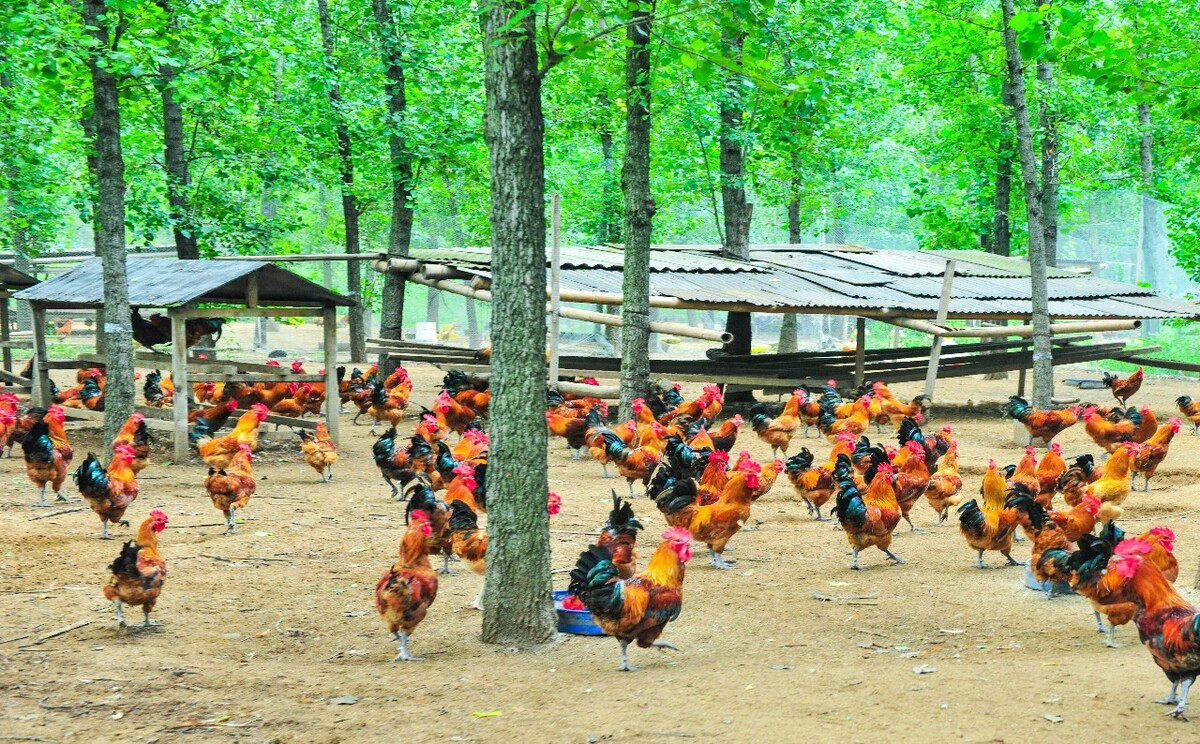Chicken farming under the forest, that is, the use of orchards, woodland open space to raise chickens, both environmental protection and cost savings, is now more and more popular with farmers. However, in order to raise good chickens, the preliminary preparations have to do enough, scientific management methods can not be less, but also pay attention to epidemic prevention.
First. The preliminary preparation
Choose a good forest
Selection of land is a big question. The age of the trees in the forest must be more than two years, the canopy is not too dense, light and ventilation should be good. Like apples, peaches, pears, these fruit trees, in the fruiting period there will be fruit decay after natural fruit fall, chickens eat easy poisoning, so do not raise chickens under these fruit trees during this period. Walnut, chestnut and other dry fruit forest is more suitable for raising chickens. It should also be noted that the selected woodland must meet the environmental requirements, must be closed, sunny, wind, dry place.
Clearing the forest land
After choosing the land, you have to clean up the debris and stones in the land. In the winter before raising chickens, the woodland must also be fully disinfected to minimize the number of pathogenic microorganisms.
Divide the forest land
To prevent disease, the woodland can be divided into areas, with each area separated by a net so large that the chickens can’t burrow through it. Build a chicken coop for each area and rotate the chickens, which will reduce the incidence of disease and allow the grass to rest.
Building a chicken coop
The size of the coop will depend on the number of chickens you have. The coop should be built in a place that is sheltered from the wind and the sun, with high and dry ground and convenient drainage and sewage. In the coop, you need to put some troughs and waterers to make it easy for the chickens to eat and drink.
Second. Feed preparation
Preparation of fresh insect feed
You can raise some insects in the forest for the chickens to eat, such as using dung grass to breed insects. Dig a pit, mix chopped straw or weeds with cow or chicken manure and pour it into the pit, pour rice water over it, cover it with sludge, and it will produce insects after a while.
Planting forage
Planting some high-quality pasture grasses under the forest for chickens to eat can save the input of concentrate feed. For example, alfalfa, white clover and duckweed are good choices.
Prepare Concentrate Feed
When buying feeds, you have to pay attention to the label, production date and shelf life, don’t buy expired feeds. Don’t buy too much at one time, 10-20 days’ worth is good. Also, don’t change feed manufacturers too often, because feed formulas and ingredients may vary from one manufacturer to another, and frequent changes may affect the health of the chicken’s digestive system.
Third. Choosing Chicken Breeds
If you want to sell chickens for both meat and eggs, you can choose excellent local breeds of chickens or hybrid chickens; if you mainly want to sell live chickens, then choose varieties such as roughage-tolerant, wide range of activities, disease-resistant soil miscellaneous chickens or three yellow chickens.
Forth. Feeding management
Move the de-warmed chicks to the forest floor
It is recommended to move at night to reduce the disturbance to the chickens.
Train to graze
Starting from de-warming, guide the chicks to forage in the woodland every morning and evening so that they can gradually adapt to living in the woodland. Allow the chicks to move around, forage and drink outside during the day, except in rainy or windy weather. Return the chicks to the coop in the evening.
Supplementary feeding
If the weather is bad or there is not enough food in the woodland, replenish the chickens with feed and water. Also, don’t let the chickens out when pesticides are being applied in the fruit woodland, you have to leave them in the coop to feed.
Preventing animal pests
You have to protect the stocking site and keep outsiders and other livestock out to prevent bringing in infectious diseases. At the same time, you must also pay attention to guard against snakes, animals, birds and other harmful animals.
https://www.incubatoregg.com/ Email: Ivy@ncedward.com
Post time: Mar-15-2024





